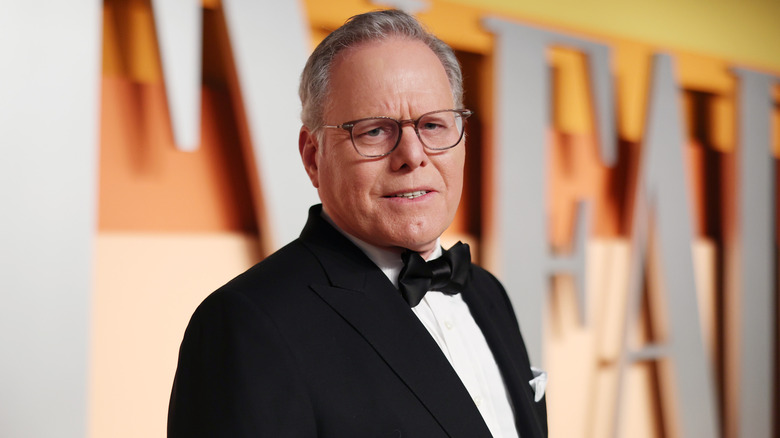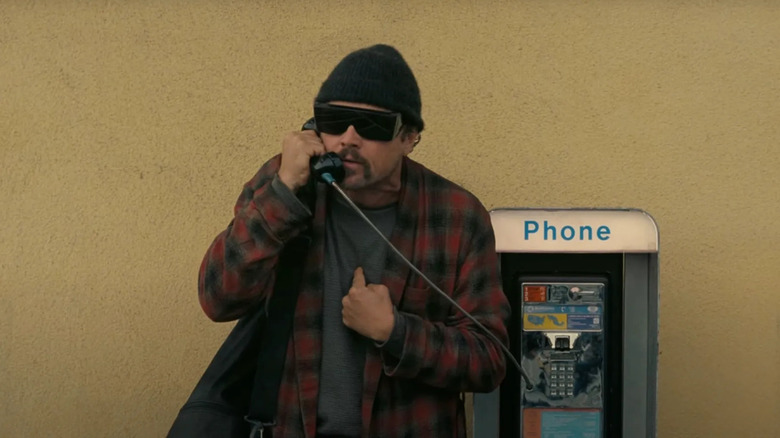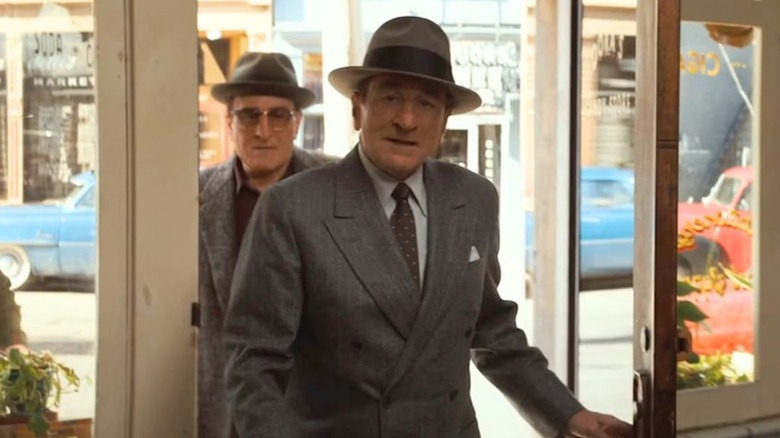Warner Bros. Head David Zaslav Can Only Blame Himself For The Studio's Latest Bomb
Three months into 2025, it's fair to say that the movie business is in a bad, bad way. As of last week, films have only generated $1.34 billion, which is a 7% drop from this time last year. This poor start has been compounded by a string of big-budget flops and dire underperformers like Bong Joon Ho's "Parasite" follow-up "Mickey 17," Marvel Studios' "Captain America: Brave New World," and Disney's live-action remake of "Snow White." The failure of Director Bong's film is especially troubling given that it was essentially an original as far as moviegoers were concerned (the novel it was based on was not widely read), which brought out the anti-art contingent of the industry who'd rather imagine themselves as a savvy studio chief instead of a risk-taking auteur. Though "Mickey 17" was not as rapturously received as "Parasite," even its detractors had to admit that it was shot through with inventive visuals and wild tonal shifts that you rarely see (intentionally) in a studio movie.
This lull is an overall Hollywood problem, but the studio most closely under a microscope right now is Warner Bros. Founded in 1923, WB has long been the Cadillac of the industry. The studio boasts a stunningly deep and prestigious library of classic films and was home to the most bankable filmmaker working today in Christopher Nolan, until the previous regime ticked him off by botching the release of his 2020 film "Tenet." After Nolan made "Oppenheimer" at Universal, there was a sense that WB had lost its way, and this perception has solidified into something approaching fact since executive David Zaslav merged his reality show trash factory, Discovery, with the venerable studio.
Clumsily rechristened Warner Bros Discovery in 2022, Zaslav's three-year run has been marred by own-goal controversies. There was his scrapping of completed films like "Batgirl" and "Coyote vs. Acme" to save money (an unprecedented severing of the studio-filmmaker covenant that badly damaged the studio's reputation), his gutting of Turner Classic Movies (a channel he claimed he watched religiously), and his antagonistic posturing during the concurrent WGA/SAG-AFTRA strikes (which earned him cascading boos during a Boston University commencement address). Zaslav sought to insulate himself from criticism (and maybe make some good movies in the process) by bringing on the respected production exec duo of Michael DeLuca and Pamela Abdy. This appears to have backfired.
While the ultimate blame for what's gone wrong at WB may be up for debate, what cannot be argued is that the studio's most recent bomb, "The Alto Knights," is wholly on Zaslav. So why is Variety trying to frame it as a DeLuca-Abdy misstep?
Michael DeLuca and Pamela Abdy's WB struggles are excusable
In an article published Friday, Variety journalist Matt Donnelly paints a portrait of peril for DeLuca and Abdy, two longtime friends who, according to his myriad of anonymous sources, have turned against each other as one release after another falls horribly short at the box office. He cites the commercial failure of pricey event movies like "Furiosa: A Mad Max Saga," "Joker: Folie à Deux," and "Mickey 17" as evidence of the duo's risk-taking philosophy gone wrong. He also looks forward to two more expensive risks — Paul Thomas Anderson's "One Battle After Another" and Maggie Gyllenhaal's punk rock horror musical "The Bride!" (based on "The Bride of Frankenstein") — to suggest that more disasters are on the horizon.
DeLuca and Abdy definitely haven't played it safe. Anderson might have movie star insurance in Leonardo DiCaprio for his $130 million adaptation of Thomas Pynchon's "Vineland," but Donnelly's sources tell him that test audiences complained about the lack of likable characters, while DeLuca and Anderson are beefing over the film's two-and-a-half hour runtime. There's legitimate cause for concern here given that Anderson has never made a film that grossed over $100 million in North America (while his last Pynchon adaptation, "Inherent Vice," grossed only $15 million worldwide), but the claims that the filmmaker, who kinda owes his career to DeLuca (he greenlit "Boogie Nights" while at New Line, and gave Anderson carte blanche on "Magnolia"), might be battling his friend over the final cut of his most expensive movie to date is standard operating procedure in Hollywood. Anderson is lobbying for his vision, while DeLuca, who reveres the director, is trying to do just enough right by his boss and the shareholders to whom he answers. These fights happen, and these two guys have been doing it long enough to know it isn't personal.
What strikes me as odd about Donnelly's piece is the suggestion that DeLuca and Abdy should be walking the plank for bombs anyone would've greenlit. Todd Phillips' "Joker" grossed over $1 billion worldwide. Of course he was going to get a massive budget and final cut on the sequel (I do question the decision to let him skip the test screening process, but I also don't think that film was salvageable as a commercial work). Meanwhile, every studio in town wanted to get in the Bong Joon Ho business after "Parasite," and I think time will be kind to the splendid "Mickey 17."
And then there's "The Alto Knights," which shouldn't be mentioned without heaping all of the blame for its inexplicable existence on Zaslav.
David Zaslav should fire himself for greenlighting The Alto Knights
According to Puck's Matthew Belloni, "The Alto Knights," a gangster drama starring Robert DeNiro in dual roles as mob bosses Vito Genovese and Frank Costello, had been on Hollywood's radar since 1974. Oscar-winning producer Irwin Winkler ("Rocky," "Raging Bull," "Goodfellas") hired Nicholas Pileggi to write the screenplay (then called "Wise Guys"), and shopped the project to every studio in town — and every studio in town said "Hell, no." But when Winkler's pal David Zaslav acquired WB, the showbiz veteran knew he had a mark in the highest of places. Soon after buying the studio, Zaslav hit up Winkler for advice on running a business he frankly had no business running. Winkler excavated Pileggi's decades-old script, almost certainly cognizant of the fact that the screenwriter was Hamptons lunch buddies with the out-of-his-depth executive.
Zaslav flipped over the idea of greenlighting a gangster movie from the writer of "Goodfellas," so he tried to muscle then WB production chief Toby Emmerich into fast-tracking the project into production. Realizing that the old, oft-rejected script had slim commercial prospects, Emmerich disobeyed his new boss. A few weeks later, after Emmerich had been fired, Zaslav leaned on new studio chiefs DeLuca and Abdy to pour $50 million into this dinosaur of a mob flick no one wanted to see. They consented, probably because they knew they wouldn't be on the hook for its failure.
Despite its funky double-De Niro hook, "The Alto Knights" grossed a paltry $3.2 million over its March 21 opening weekend, coming in sixth behind the loudly lamented bomb "Mickey 17" in its third frame. Granted, it cost $68 million less than Bong's movie, but with a sizable marketing spend and dicey pedigree, it's a far more embarrassing failure. The once great Barry Levinson (also a member of the Hamptons lunch bunch) hadn't helmed a theatrical release in a decade and, worse, hadn't knocked out a watchable studio flick since 2001's "Bandits." The movie was an industry-wide joke when it got greenlit, and if you read Belloni's article, you knew precisely why. It was the first sign that Zaslav wasn't fit to run a movie studio, and he's done nothing but crater WB's value over the last three years.
DeLuca and Abdy have stumbled, but they love movies and take big swings. Zaslav, who seems to hate his studio's crown animation jewel Looney Tunes, and buries finished movies that people worked hard to make, is the problem here. And no whitewashing Variety article can cover up what's so screamingly obvious.


